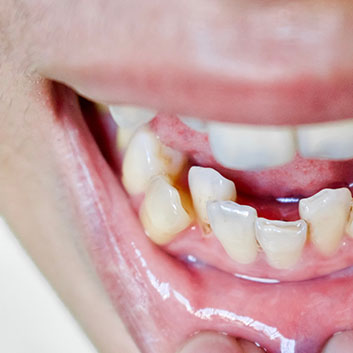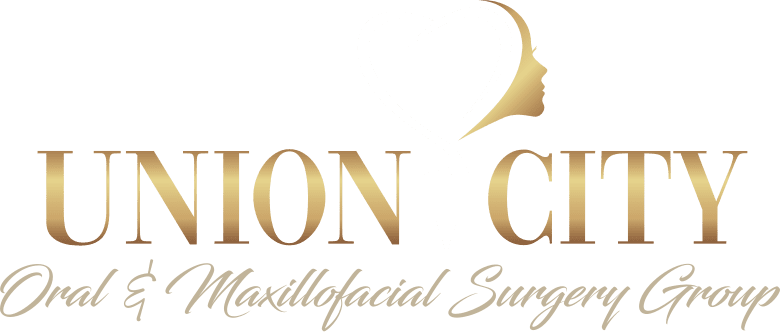Occlusal Adjustment (Bite Adjustment)
What This Page Covers:
- Occlusion: Occlusion refers to how your upper and lower teeth align when resting or chewing, impacting overall oral health.
- Misalignment: Misaligned bites, or malocclusion, can cause discomfort and long-term issues, often necessitating occlusal adjustment.
- Benefits: Occlusal adjustments reduce tooth wear, alleviate jaw pain, improve chewing, enhance appearance, and protect dental restorations.
- Union City Oral Surgery Group: Union City Oral Surgery Group offers expert occlusal adjustments to improve your bite and overall oral health.
The way your bottom and upper teeth interact when chewing or resting is known as your occlusion. A healthy bite is one in which the upper teeth slowly overlap the lower teeth when at rest. Having a misaligned bite, depending on the severity, can be fairly harmless and not lead to any major complications with eating, chewing, or speaking.
However, for some, their irregular bite can cause extreme discomfort and even long-lasting symptoms. When this is the case, it is recommended you receive an occlusal adjustment to have your misalignment properly diagnosed and treated. To see if you are a good candidate for an occlusal adjustment procedure, it is best to reach out to a dedicated Union City oral surgeon today. Our doctors at Union City Oral Surgery Group have devoted their careers to the well-being and overall oral health of our community, and we would love to help remedy your discomfort today.
UNDERSTANDING AN OCCLUSAL ADJUSTMENT
An occlusal adjustment is a fairly simple procedure that is designed to help straighten out your bite and any misaligned teeth. Also known as malocclusion, the misalignment of your teeth can be categorized into three separate categories:
- Class One: Class one malocclusion includes a regular bite but overcrowding, irregular spacing between the teeth, or other alignment irregularities.
- Class Two: Class two malocclusion is commonly referred to as an overbite, which is when the upper teeth extend far past the bottom.
- Class Three: Class three malocclusion is an underbite, which is when the bottom teeth extend far past the upper.
Misalignment, or the need for an occlusal adjustment, can come from a variety of sources. Commonly, it is genetic and passed down from parents. Other common reasons include cleft palate, impacted teeth, improper oral care, thumb-sucking, or prolonged bottle feeding. When gone untreated, the individual may begin to experience general discomfort and problems chewing.
Expected side effects can include biting the cheeks and tongue, as well as cracking or chipping your teeth. In more extreme cases, a lisp may develop, as well as temporomandibular joint problems.
WHO SHOULD GET AN OCCLUSAL ADJUSTMENT?
Occlusal adjustment can be a game-changer for a wide variety of individuals. If you’re someone who often finds themselves wincing from jaw pain or someone who’s been told they grind their teeth at night, this procedure could be exactly what you need. People with misaligned teeth who experience difficulty chewing or those noticing uneven wear on their teeth could see significant improvements.
Additionally, if you’ve had dental work done, such as fillings, crowns, or bridges, and something just doesn’t feel right, an occlusal adjustment might be the key to achieving that perfect fit and preventing further damage. It’s not only about fixing current discomforts but also about preventing future dental woes.
So, whether you’re dealing with discomfort, dental restorations, or just aiming to protect your teeth from future issues, you might find that occlusal adjustment offers the relief and solutions you’ve been seeking.
WHAT ARE THE BENEFITS OF CORRECTING YOUR BITE?
Correcting your bite through an occlusal adjustment can feel like you’re giving your mouth a fresh start. It’s not just about getting your teeth to fit together neatly; it’s about improving the overall health and functionality of your mouth. Here are some key benefits you might enjoy:
- Less wear and tear on your teeth: A properly aligned bite means your teeth aren’t grinding against each other in harmful ways. This can reduce the wear and tear that leads to cracks, chips, and even tooth loss over time.
- Reduced jaw pain and headaches: Many people don’t realize that their bite could be the culprit behind chronic jaw pain or persistent headaches. Once your bite is adjusted, you might find these discomforts start to disappear, giving you more pain-free days.
- Improved chewing and digestion: When your teeth are aligned correctly, you can chew your food more effectively. This not only makes eating more enjoyable but can also help with digestion since the process starts in your mouth.
- Enhanced appearance: Sometimes, an occlusal adjustment can also improve the look of your smile. By ensuring your teeth meet correctly, your jawline might appear more symmetrical, enhancing your overall appearance.
- Protection for dental restorations: If you have fillings, crowns, or bridges, a proper bite helps protect these from undue stress, making them last longer.
These benefits show that occlusal adjustment is more than a dental procedure; it’s a step towards a healthier, happier mouth.
WHAT TO EXPECT FROM THE OCCLUSAL ADJUSTMENT PROCEDURE
Once your misalignment has been diagnosed, your oral surgeon can begin to prep you for the occlusal adjustment procedure. This can be broken down into the following steps:
The Procedure
Most commonly, before beginning the procedure, your oral surgeon will test your bite. This can be done by having you bite down on a special colored strip of paper that marks exactly where your upper and lower teeth are hitting. A healthy bite would have both teeth meeting equal contact. Using this assessment, your oral surgeon will begin to smooth the problem areas of your teeth with a dental polisher. This process will be repeated several times until the bite is in a good position.
It’s not uncommon for an occlusal adjustment to be done in conjunction with other cosmetic alignment procedures, such as Invisalign or braces. These methods of cosmetic dentistry are meant to specifically target the look and straightening of your teeth. If your irregular bite has caused other problems, such as TMJ or chipped teeth, the team at Union City Oral Surgery Group is here to help.
Recovery
After an occlusal adjustment procedure, you might be curious about what comes next. Initially, your bite may feel a bit different or strange. This is totally normal! It’s your mouth getting used to its new alignment. During the first few days, you may notice some sensitivity in your teeth or gums. This sensitivity is usually mild and temporary. It’s also common to experience a slight adjustment period where your chewing feels a bit off. However, this sensation will fade as you adapt to your newly adjusted bite.
To make this adjustment period more comfortable, avoid hard or very crunchy foods for the first couple of days. If you have any concerns or if the sensitivity doesn’t decrease, don’t hesitate to reach out to your dentist. They can offer advice or help address any issues. Remember, every person’s mouth adjusts at its own pace, so give yourself time to adapt to the feel of your corrected bite.
IS OCCLUSAL ADJUSTMENT PAINFUL?
When it comes to getting an occlusal adjustment, a common worry is whether the procedure is going to be painful. The great news is that most people find occlusal adjustment to be surprisingly comfortable. During the procedure, your dentist will use fine tools to slightly reshape the surfaces of your teeth that come into contact with each other. This process is more about precision than pressure, so it’s typically not painful.
You might feel a bit of vibration or pressure while the adjustments are being made, but this is generally well-tolerated. Dentists are skilled at ensuring you’re as comfortable as possible during the procedure, and they can use local anesthesia to numb the area if needed.
So, while the thought of having your teeth adjusted might sound a bit daunting, rest assured that discomfort is minimal for most patients. It’s all about making small, careful changes to improve your bite and overall oral health, without causing you pain.
HOW TO CARE FOR YOUR BITE AFTER AN OCCLUSAL ADJUSTMENT?
Caring for your bite after an occlusal adjustment involves a few straightforward steps to ensure your mouth heals properly and you maintain the benefits of the procedure. Initially, it’s wise to stick to softer foods to ease any discomfort and to help your teeth and jaw adjust without undue stress. Brushing thoroughly and flossing carefully around the adjusted areas will keep your mouth clean and aid in the healing process.
Also, be mindful of not clenching or grinding your teeth, especially if these habits contributed to your need for an adjustment in the first place. Your dentist may recommend wearing a night guard to protect your teeth while you sleep. Finally, keep up with your dental check-ups. Regular visits allow your dentist to monitor your bite’s alignment and ensure everything is as it should be. By following these simple care steps, you’ll be helping your bite adjustment last and keeping your oral health in top shape.
SPEAK TO A PROFESSIONAL ORAL SURGEON TODAY
Whether you are actively unsatisfied with the look of your bite or it is causing you repeated discomfort, an occlusal adjustment is likely the procedure for you. When looking for an oral surgeon you can trust in Union City, look no further than Union City Oral Surgery Group. Our team of dedicated and highly-trained oral and maxillofacial surgeons is proud to offer access to our state-of-the-art facility and minimally-invasive surgical techniques.
To get an idea of what our people-first approach to restorative oral surgery looks like today, give our Union City, New Jersey office a call at (201) 601-9262 or fill out our contact form. We will be here to support you every step of the way.


